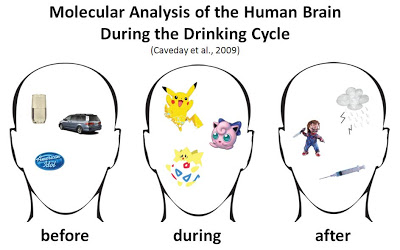Neuroscience

This post is for all you New Year's Eve party goers who don't remember where you were or what you did. If that's the case, then you experienced an alcohol-induced blackout. Haven't you always wondered about the clinical manifestations and neurobiological mechanisms of alcohol-induced blackouts? Maybe you have, but you can't remember.
A definitive review of the phenomenon by Rose and Grant (2010) explains that there are two different types of blackout: en bloc, a complete loss of memory for the affected time period; and fragmentary, where bits and pieces of memories remain. The en bloc blackout is more likely to occur when a large quantity of alcohol is ingested within a small time period.
What causes an alcohol blackout? A good source of information on the topic is the NIAAA website: What Happened? Alcohol, Memory Blackouts, and the Brain:
Women are more susceptible to alcohol blackouts than men (and recover more slowly) because of their generally less muscular body composition, and gender differences in pharmacokinetics.
Cheers to knowing what's happening in your brain after downing a few too many Jell-O shots. If you can remember tomorrow...
Reference
Rose, M., & Grant, J. (2010). Alcohol-Induced Blackout Journal of Addiction Medicine, 4 (2), 61-73 DOI: 10.1097/ADM.0b013e3181e1299d

- Did I Do That? The Psychology Of Alcohol-induced Blackouts
The morning after. Photo credit: Sophie ScottWhen our autobiographical memory lets us down, how do we reconstruct the lost chapters? Two psychologists Robert Nash and Melanie Takarangi have identified the perfect population for investigating this very...
- The Mere Sight Of Alcohol Impairs Drinkers' Memories
For students who like a tipple or three, the mere sight of a bottle of Jack Daniels can have a detrimental effect on their memory. Dennis Kramer and Stephen Schmidt, who made the observation, said this is probably due to the emotional salience alcohol...
- Everything Is Wrong
...about protein synthesis and memory formation, apparently. In keeping with the general theme of propranolol as a "memory eraser," a brand new iconoclastic paper (Canal, Chang, & Gold, 2007) claims that massive fluctuations in neurotransmitter levels...
- Alcohol => Hippocampus => Blackout
That's what I got out of the frightening story in Tuesday's New York Times story The Grim Neurology of Teenage Drinking. Apparently adolescent rats are more severely affected by serious alcohol consumption than are adults; this seems to be true...
- About A New Colleague
Headline in the UConn Advance: "Teenagers exposed to alcohol ads drink more" The study was published in the Jan 3 issue of the Archives of Pediatric and Adolescent Medicine, by Leslie Snyder, professor of communication sciences and director of the UConn...
Neuroscience
Alcohol Blackout
This post is for all you New Year's Eve party goers who don't remember where you were or what you did. If that's the case, then you experienced an alcohol-induced blackout. Haven't you always wondered about the clinical manifestations and neurobiological mechanisms of alcohol-induced blackouts? Maybe you have, but you can't remember.
A definitive review of the phenomenon by Rose and Grant (2010) explains that there are two different types of blackout: en bloc, a complete loss of memory for the affected time period; and fragmentary, where bits and pieces of memories remain. The en bloc blackout is more likely to occur when a large quantity of alcohol is ingested within a small time period.
What causes an alcohol blackout? A good source of information on the topic is the NIAAA website: What Happened? Alcohol, Memory Blackouts, and the Brain:
Alcohol primarily interferes with the ability to form new long–term memories, leaving intact previously established long–term memories and the ability to keep new information active in memory for brief periods. ... Blackouts are much more common among social drinkers—including college drinkers—than was previously assumed, and have been found to encompass events ranging from conversations to intercourse. Mechanisms underlying alcohol–induced memory impairments include disruption of activity in the hippocampus, a brain region that plays a central role in the formation of new autobiographical memories.Rose and Grant (2010) summarize the suspected hippocampal mechanisms as follows:
Blackouts are caused by breakdown in the transfer of short-term memory into long-term storage and subsequent retrieval primarily through dose-dependent disruption of hippocampal CA1 pyramidal cell activity. The exact mechanism is believed to involve potentiation of gamma-aminobutyric acid-alpha [GABA-A]-mediated inhibition and interference with excitatory hippocampal N-methyl-d-aspartate [NMDA] receptor activation, resulting in decreased long-term potentiation [LTP].In addition...
Another possible mechanism involves disrupted septohippocampal theta rhythm activity because of enhanced medial septal area gamma-aminobutyric acid [GABA]-ergic neurotransmission.
Women are more susceptible to alcohol blackouts than men (and recover more slowly) because of their generally less muscular body composition, and gender differences in pharmacokinetics.
Cheers to knowing what's happening in your brain after downing a few too many Jell-O shots. If you can remember tomorrow...
Reference
Rose, M., & Grant, J. (2010). Alcohol-Induced Blackout Journal of Addiction Medicine, 4 (2), 61-73 DOI: 10.1097/ADM.0b013e3181e1299d

- Did I Do That? The Psychology Of Alcohol-induced Blackouts
The morning after. Photo credit: Sophie ScottWhen our autobiographical memory lets us down, how do we reconstruct the lost chapters? Two psychologists Robert Nash and Melanie Takarangi have identified the perfect population for investigating this very...
- The Mere Sight Of Alcohol Impairs Drinkers' Memories
For students who like a tipple or three, the mere sight of a bottle of Jack Daniels can have a detrimental effect on their memory. Dennis Kramer and Stephen Schmidt, who made the observation, said this is probably due to the emotional salience alcohol...
- Everything Is Wrong
...about protein synthesis and memory formation, apparently. In keeping with the general theme of propranolol as a "memory eraser," a brand new iconoclastic paper (Canal, Chang, & Gold, 2007) claims that massive fluctuations in neurotransmitter levels...
- Alcohol => Hippocampus => Blackout
That's what I got out of the frightening story in Tuesday's New York Times story The Grim Neurology of Teenage Drinking. Apparently adolescent rats are more severely affected by serious alcohol consumption than are adults; this seems to be true...
- About A New Colleague
Headline in the UConn Advance: "Teenagers exposed to alcohol ads drink more" The study was published in the Jan 3 issue of the Archives of Pediatric and Adolescent Medicine, by Leslie Snyder, professor of communication sciences and director of the UConn...
